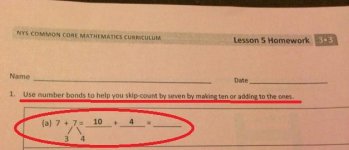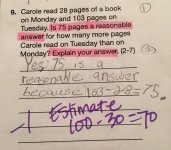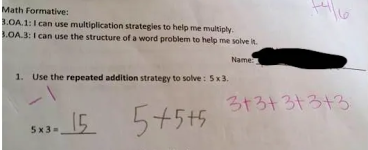My missus just tore your post apart, but I'd get a holiday for writing what she said. She advised you to go read the maths curriculum then come back and comment. Rounding is one of the methods taught, as is tens and ones. It's about teaching a variety of methods as not all children will understand all methods and it gives them all a good base.
But this doesn't seem to be about teaching a variety of methods, this is part of common core and involves teaching the particular method they're specifying and explicitly showing the working/demonstrating the various steps of that method.
I think you've undermined your own argument there, if multiple methods were taught and/or acceptable then I suspect some of these common core problems that go viral on the net every so often wouldn't have done so.
I don't think this particular method is necessarily bad, it perhaps does approximate how some people solve this stuff in their head, though lots of this ought to be intuitive to some (smart) kids and could be incredibly frustrating/come across as very dumbed down:


That latter one is irritating as it is something that a smart kid can do in their head and/or intuitively know is the exact answer.
I think the question might have been clearer had the "estimate" not also been the exact answer (assuming that was the specified intent further up the question paper) but rather had been the actual estimate they were seemingly expecting the student to come up with, especially as the teacher is rounding to the nearest 10, not the nearest 5.
Alternatively, I wonder if the teacher has got it wrong too and the person setting the question expected them to round 28 to 30 and round 103 to 105 - don't know whether the rest of the question sheet has some instructions re: estimate by rounding numbers to the nearest 10 or nearest 5 etc.. presumably it at least specifies something about how this is an exercise along those lines.
I dunno, some of it just seems like it's going to just annoy kids who are already pretty good at maths or have other ways of working that suit them better. IMO as long as they can show their working then surely that's the key thing here.




